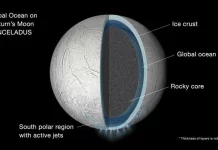
Recent oceanic research has provided striking evidence of human influence on climate change, specifically showing how activities related to the increase in CO2 emissions have significantly impacted the seasonal cycle amplitude of sea surface temperatures (SST).
This groundbreaking work, conducted by scientists including Benjamin Santer at the Woods Hole Oceanographic Institute (WHOI), presents a clear human “fingerprint” on the ocean’s temperatures.
The study, detailed in Nature Climate Change, utilized four different observational data sets, including satellite records and measurements from ships and floats dating back to 1950.
These extensive data analyses revealed consistent patterns across all sources, indicating a strong human influence on the seasonal changes in SST.
Notably, the study found an increase in the seasonal cycle amplitude at Northern Hemisphere mid-latitudes, largely attributed to changes in the ocean’s mixed-layer depth, and a distinct dipole pattern between 40˚S and 55˚S, primarily driven by changes in surface winds.
By employing models to predict patterns of SST change, researchers found these patterns could be identified with high statistical confidence across observed SST products and model simulations.
The findings underscore that greenhouse gas increases are the main driver of these changes, with contributions also from anthropogenic aerosol and ozone forcing.
This research builds on Santer’s over 30 years of work in climate fingerprinting, marking the first time such detailed patterns of climate change have been observed in seasonal sea surface temperatures.
The study’s co-lead author, Dr. Jia-Rui Shi, highlighted that the seasonal cycle amplitude of SST is intensifying, with summer warming becoming more pronounced than winter warming.
This is particularly evident in the Northern Hemisphere, where ocean basin sizes are smaller, and in the Southern Hemisphere, where SST changes are largely influenced by wind patterns linked to atmospheric warming.
The implications of this human-induced change in ocean temperatures are far-reaching, potentially affecting marine ecosystems, fisheries, and the distribution of nutrients significantly.
The researchers stress the importance of recognizing the anthropogenic influence on seasonality for its scientific, economic, and societal impacts.
In the context of global warming, where the ocean absorbs approximately 90% of the Earth’s excess heat, understanding these changes is crucial.
The year 2023 saw the highest upper ocean heat content on record, prompting concerns about the ocean’s role in climate regulation and its capacity to absorb CO2.
Warming oceans not only lead to acidification, affecting marine life, but also impact the ocean’s ability to act as a carbon sink, which is vital for mitigating climate change.
This study serves as a compelling call to action, emphasizing the need for policy decisions to be informed by the best scientific understanding of human effects on the climate and the urgency of addressing climate change globally.
The research findings can be found in Nature Climate Change.
Copyright © 2024 Knowridge Science Report. All rights reserved.



